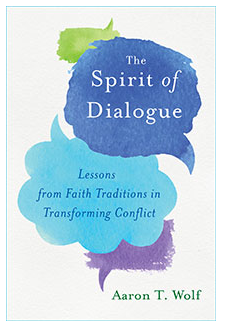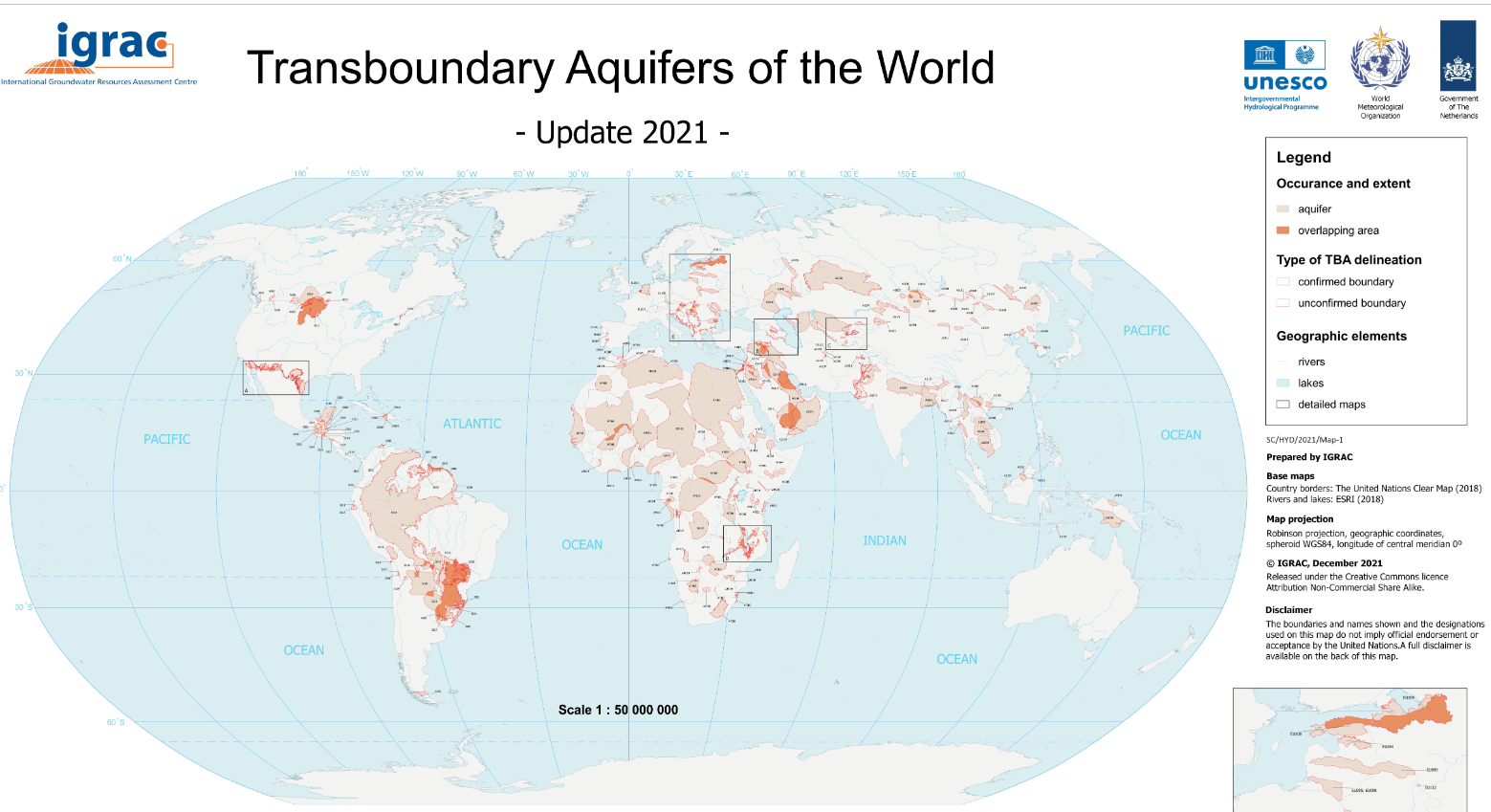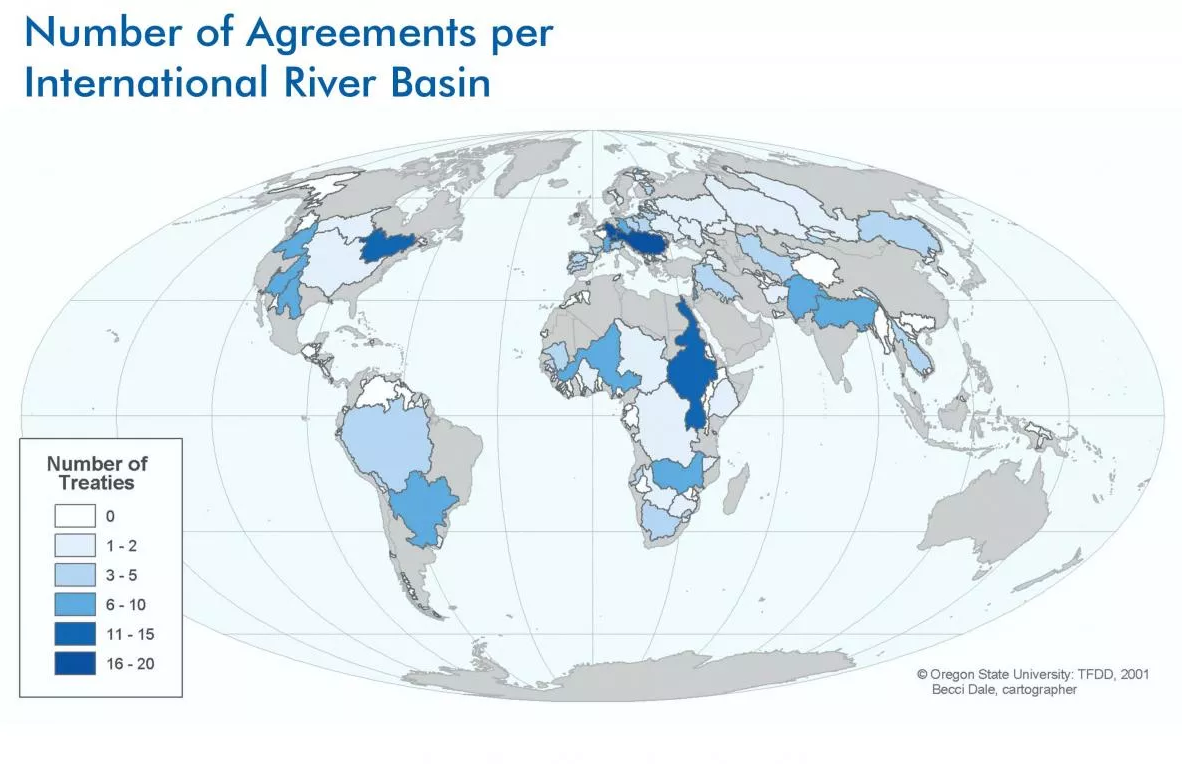Listen here on Spotify | Listen here on Apple Podcast
Episode released on July 11, 2024
Episode recorded on April 12, 2024
 Aaron Wolf is a Professor of Geography in the College of Earth, Ocean and Atmospheric Sciences at Oregon State University.
Aaron Wolf is a Professor of Geography in the College of Earth, Ocean and Atmospheric Sciences at Oregon State University.
Highlights | Transcript
- Aaron has published several books, including The Spirit of Dialogue, Lessons from Faith Traditions in Transforming Conflict in 2017 (Fig. 1); also Hydropolitics Along the Jordan River in 1995 and contributed to others such as the United Nations Transboundary Freshwater Dispute Resolution.
- Water has been a casualty of recent wars with destruction of the Kakhova dam in the Russian-Ukraine war. In addition, the Israeli-Palestinian water greatly reduced access to the coastal aquifer for most Palestinians in Ghaza and lack of electricity caused shutdown of wastewater treatment plants and reduced output from some small desalination plants.
- The theme of United Nations World Water Day in 2024 (March 22nd) Water for Peace. Transboundary waters account for ~60% of world’s freshwater, covering more than half of the Earth’s land surface, and impacting ~40% of the global population. A total of 153 countries have at least one of the 310 transboundary rivers or lakes, or one of 468 transboundary aquifers that included in the Intl. Groundwater Resources Assessment Center (IGRAC) maps (Fig. 2) (UNECE link).
- Sustainable Development Goal 6: Indicator 6.5.2 “Proportion of transboundary basin area with an operational arrangement for water cooperation”: Only 24 out of the 101 countries where SDG indicator 6.5.2 can be calculated reported that all their transboundary basins are covered by cooperation arrangements with an additional 22 having high levels of cooperation (link).
- Shared water resources can offer an opportunity for dialogue because of their importance to the economy, culture, and religion.
- Early discussions related to water suggested that it would be the major cause of wars in the 21st century. Counting the number of conflicts linked to water highlighted that water was a cause for cooperation in 2/3rd of the cases, serving to build peace in these situations. Work by Mark Zeitoun and Naho Mirumachi support these findings.
- Aaron developed a database of ~800 water treaties globally and supports a website with an atlas and database of freshwater agreements (Fig. 3). These agreements generally stand the test of time, including decolonization, shifting governments etc.
- The Indus Basin Water Treaty (India and Pakistan), signed in 1960, withstood four wars.
- Spirituality plays an important role in transboundary negotiations and is often neglected in the West. An example is the Transboundary Helmand River Basin where the Taliban is building the Qosh Tepa irrigation canal in Afghanistan to divert ≤25% of water from the Amu Darya (further impacting the Aral Sea). Faith traditions of Muslims: water is a human right, should never deny somebody else water (articles of faith in Islam).
- Common thread: somebody upstream builds something, no agreement with downstream neighbors and how it impacts them.
- Ethiopia - Egypt: Grand Ethiopian Renaissance Dam (GERD) impacts Egypt who relies on the Nile
- Turkey – Iraq: Turkey building dams in the Tigris Euphrates Basin impacts downstream countries
- India – Bangladesh Ganga Water Treaty:
- Mekong River Basin: China building dams affecting countries in SE Asia (Mekong River Commission)
- Cooperation between upstream and downstream:
- Upstream storage could reduce downstream flooding, extend growing season, and improve navigation
- Upstream hydropower could be shared with downstream countries.
- Hydropolitics along the Jordan River (Jordan, United Arab Emirates (UAE) investment in solar power to provide energy to Israel) and Israel reducing water use of Jordan River (replacing it with seawater desalination) EcoPeace Middle East
- Subnational conflicts, often more violent.
- Kenya, 2014, over 300 people killed, amplified by drought (link)
- Conflict in the Inner Niger Delta in Mali (Meijer et al., 2024)
- IHE Delft does a lot of work on sub-national water conflicts (link)
- Narmada River Basin disputes between states in India (link)
- Western US conflicts (Wolf working with Bureau of Reclamation on conflict resolution)
- Transboundary Freshwater Dispute Resolution (Wolf and Priscoli): Western rational approach relies on science and models. Important to consider faith traditions, empathy, honor, and history etc.
- Dept. of Defense supporting the Global Water Security Center at the Univ. of Alabama. Data scientists using AI/ML, collecting data from newspapers, tweets, satellites, and internet to assess situations.
Increasing climate extremes (droughts and floods) amplify water conflicts. Need to develop more approaches to cooperation (e.g., Lake Albert, Oregon, joint committee, fact finding mission etc.).

Figure 1. The Spirit of Dialogue by Aaron Wolf, published in 2017 (link). 
Figure 2. Transboundary aquifers of the world (updated 2021) (IGRAC). 
Figure 3. Atlas of global freshwater agreements (link).



